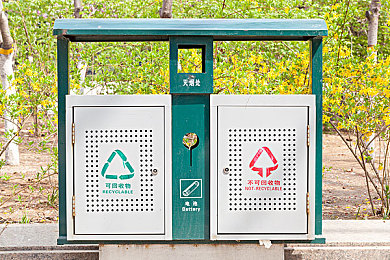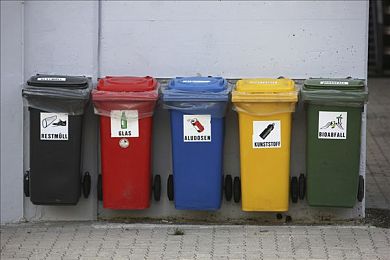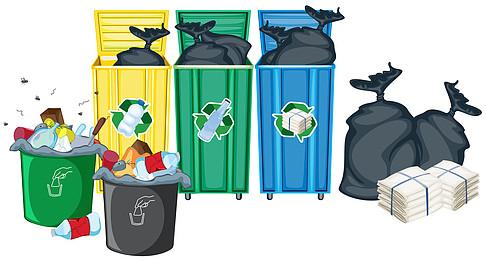“你是什么垃圾?”之垃圾分类条例
2019年7月1日《上海市生活垃圾管理条例》开始实施,上海人民正式迎来全民垃圾分类时代。不按规定混投垃圾,先责令改正,拒不改正的个人最高罚款200元,单位最高罚5万元。堪称“史上最严垃圾分类措施”。
垃圾分类在中国社交媒体上的讨论度日益高涨,同样的外媒也关注到了这一点,并且引发广泛热议。我们来看下几大外媒是如何看待垃圾分类的!

石英网:“你是什么垃圾?”
据说最近上海人下楼扔个垃圾,很有可能要接受监督员阿姨的灵魂拷问:
“你是什么垃圾”在中国成为社交媒体热门话题,有着一语双关的内涵。石英网就发表文章:
“你是什么垃圾?”:中国首个严肃的垃圾分类条例让上海人很抓狂
On social media platform Weibo, a collection of posts under the topic #你是什么垃圾#, which can be translated into both “what’s your rubbish” and “what kind of rubbish are you,” have generated nearly 20 million views as of today (July 5).
在国内社交媒体微博上,不少人以#你是什么垃圾#为标签发帖,这个表达既可以理解为“你的垃圾是什么类型的垃圾”,又可以理解为“你是什么类型的垃圾”。
People find it counterintuitive that corn should go into “other waste” instead of kitchen waste because it doesn’t decompose, that fish bones belong to “kitchen waste,” while ribs belong to “other waste.” Some said they were asked “What kind of rubbish are you” by the cleaning staff standing by the bins.
人们发现一些垃圾的分类有些和日常认知不大一样。比如玉米芯是“其他垃圾”而不是“厨余垃圾”,因为它不易降解。鱼骨属于“厨余垃圾”而棒骨却属于“其他垃圾”。有些人表示,他们扔垃圾时被垃圾箱一旁的监督员叫住问道:“你是什么垃圾?”

彭博社:上海可成发展中国家典范
在《条例》正式实施的第一天,彭博社发表评论文章称目前中国的“垃圾战争”能够给发展中国家树立良好的榜样。
➤ 垃圾分类,中国一直在尝试
文章表示,在全球大部分地区,推动回收业的是逐利行为而非环保关注,回收行业很大程度由拾荒者(self-employed waste pickers)完成,但随着城市日渐富裕,愿意拾荒的人越来越少。
早在2000年,预见此问题的中国开始尝试垃圾分类:As far back as 2000, the Chinese government foresaw this problem and designated eight cities, including Shanghai, to pilot municipal recycling programs. ...Not only did the cities lack the equipment and facilities to recycle, residents were given no incentives to sort their trash or education in why it was so important.
早在2000年,中国政府就预见了这个问题,指定了包括上海在内的8个试点城市展开垃圾分类。但不仅是城市缺乏垃圾分类回收的设备,居民们也没有意识到垃圾分类的重要性,并且该举措没有任何激励措施。
Regardless, the government is trying again. In 2017, China announced a plan to promote "garbage sorting" in China's major cities. ...Over the last two years, several have embarked on modest pilot programs.
但中国又做出了新的尝试。2017年宣布在大城市进行“垃圾分类”的计划,在过去两年,多个城市展开了一定规模的试点。
➤ 目前中国最具体,最广泛的回收措施
文章写道,目前上海垃圾分类是中国史上最具体(visible)、最广泛(extensive)的垃圾分类回收举措:
Shanghai's new program is the most visible and extensive municipal recycling initiative ever attempted in China.
上海的新举措是中国史上最具体、最广泛的垃圾回收项目。
Importantly, the system in Shanghai is uniquely public and punitive.
关键是,这个分类回收体系非常公开,而且具有惩罚性质。
On Sina Weibo, China's Twitter-like social media service, the subject has repeatedly trended, with reports that the new regulations apply to foreign tourists as well proving particularly popular. Younger Chinese seem to have favorable opinions of the program, though they fear it will be time-consuming.
在中国的社交媒体新浪微博上,这一话题热度持续走高。有报道称,这项举措同样适用于在上海的外国游客。该举措非常受欢迎,虽然可能时间上要消耗多一些,但年轻人都对此持有非常积极的评价。
➤ 为发展中国家提供范例
垃圾回收分类对上海来说仍任重道远,但能引起居民的讨论,本身就是一种很大的进步。
Still, the fact that Shanghai has residents thinking and talking about waste on social media, in their compounds and at home is remarkable progress.
虽然如此,但是上海让居民思考垃圾分类,在家中、小区里和社交媒体上讨论垃圾分类,这本身就是很大的进步。
上海的尝试同样给发展中国家、甚至全世界都上了一课。
It's also a lesson to other developing countries that the first step in creating a modern waste management system is to educate the public and foster a sense that recycling is a collective civic responsibility. If the world is going to clean up its trash heaps, Shanghai’s new program could well be the model.
上海也给其他发展中国家上了一课:打造现代垃圾管理体系的第一步是教育公众,形成一种全体公民责任的理念。在全世界的“垃圾之战”中,上海的新举措也是很好的典范。

路透社:中国向污染宣战的关键一环
今年是中国向污染宣战的第六年,而回收则是环保中的重要一环:
China is in the sixth year of a “war on pollution” designed not only to clean up its skies, soil and water but also upgrade its heavy industrial economy and “comprehensively utilize” its resources, including waste. Improving recycling rates is crucial to China’s strategy.
今年是中国向污染宣战的第六年。中国不但要防治大气污染,保持土壤和水源清洁,还要升级重工业,“综合利用”资源,包括废物。因此,提升回收率是中国向污染宣战的关键一环。
China is building hundreds of “waste to energy” plants that use garbage to generate power. It is also establishing a “waste-free city” scheme and constructing high-tech “comprehensive utilization bases” across the country.
中国建起了数百座“转废为能”的工厂,用垃圾可以发电,还发起了“无废城市”计划,在全国范围内建起了高科技的“综合利用基地”。
这次上海垃圾分类条例的推行让我们欣喜地看到,网民们热议的是“怎么分”,而不是“要不要分”。这说明污染防治已经成为全民共识。
有关垃圾分类,您怎么看?
垃圾分类在中国社交媒体上的讨论度日益高涨,同样的外媒也关注到了这一点,并且引发广泛热议。我们来看下几大外媒是如何看待垃圾分类的!

石英网:“你是什么垃圾?”
据说最近上海人下楼扔个垃圾,很有可能要接受监督员阿姨的灵魂拷问:
“你是什么垃圾”在中国成为社交媒体热门话题,有着一语双关的内涵。石英网就发表文章:
“你是什么垃圾?”:中国首个严肃的垃圾分类条例让上海人很抓狂
On social media platform Weibo, a collection of posts under the topic #你是什么垃圾#, which can be translated into both “what’s your rubbish” and “what kind of rubbish are you,” have generated nearly 20 million views as of today (July 5).
在国内社交媒体微博上,不少人以#你是什么垃圾#为标签发帖,这个表达既可以理解为“你的垃圾是什么类型的垃圾”,又可以理解为“你是什么类型的垃圾”。
People find it counterintuitive that corn should go into “other waste” instead of kitchen waste because it doesn’t decompose, that fish bones belong to “kitchen waste,” while ribs belong to “other waste.” Some said they were asked “What kind of rubbish are you” by the cleaning staff standing by the bins.
人们发现一些垃圾的分类有些和日常认知不大一样。比如玉米芯是“其他垃圾”而不是“厨余垃圾”,因为它不易降解。鱼骨属于“厨余垃圾”而棒骨却属于“其他垃圾”。有些人表示,他们扔垃圾时被垃圾箱一旁的监督员叫住问道:“你是什么垃圾?”

彭博社:上海可成发展中国家典范
在《条例》正式实施的第一天,彭博社发表评论文章称目前中国的“垃圾战争”能够给发展中国家树立良好的榜样。
➤ 垃圾分类,中国一直在尝试
文章表示,在全球大部分地区,推动回收业的是逐利行为而非环保关注,回收行业很大程度由拾荒者(self-employed waste pickers)完成,但随着城市日渐富裕,愿意拾荒的人越来越少。
早在2000年,预见此问题的中国开始尝试垃圾分类:As far back as 2000, the Chinese government foresaw this problem and designated eight cities, including Shanghai, to pilot municipal recycling programs. ...Not only did the cities lack the equipment and facilities to recycle, residents were given no incentives to sort their trash or education in why it was so important.
早在2000年,中国政府就预见了这个问题,指定了包括上海在内的8个试点城市展开垃圾分类。但不仅是城市缺乏垃圾分类回收的设备,居民们也没有意识到垃圾分类的重要性,并且该举措没有任何激励措施。
Regardless, the government is trying again. In 2017, China announced a plan to promote "garbage sorting" in China's major cities. ...Over the last two years, several have embarked on modest pilot programs.
但中国又做出了新的尝试。2017年宣布在大城市进行“垃圾分类”的计划,在过去两年,多个城市展开了一定规模的试点。
➤ 目前中国最具体,最广泛的回收措施
文章写道,目前上海垃圾分类是中国史上最具体(visible)、最广泛(extensive)的垃圾分类回收举措:
Shanghai's new program is the most visible and extensive municipal recycling initiative ever attempted in China.
上海的新举措是中国史上最具体、最广泛的垃圾回收项目。
Importantly, the system in Shanghai is uniquely public and punitive.
关键是,这个分类回收体系非常公开,而且具有惩罚性质。
On Sina Weibo, China's Twitter-like social media service, the subject has repeatedly trended, with reports that the new regulations apply to foreign tourists as well proving particularly popular. Younger Chinese seem to have favorable opinions of the program, though they fear it will be time-consuming.
在中国的社交媒体新浪微博上,这一话题热度持续走高。有报道称,这项举措同样适用于在上海的外国游客。该举措非常受欢迎,虽然可能时间上要消耗多一些,但年轻人都对此持有非常积极的评价。
➤ 为发展中国家提供范例
垃圾回收分类对上海来说仍任重道远,但能引起居民的讨论,本身就是一种很大的进步。
Still, the fact that Shanghai has residents thinking and talking about waste on social media, in their compounds and at home is remarkable progress.
虽然如此,但是上海让居民思考垃圾分类,在家中、小区里和社交媒体上讨论垃圾分类,这本身就是很大的进步。
上海的尝试同样给发展中国家、甚至全世界都上了一课。
It's also a lesson to other developing countries that the first step in creating a modern waste management system is to educate the public and foster a sense that recycling is a collective civic responsibility. If the world is going to clean up its trash heaps, Shanghai’s new program could well be the model.
上海也给其他发展中国家上了一课:打造现代垃圾管理体系的第一步是教育公众,形成一种全体公民责任的理念。在全世界的“垃圾之战”中,上海的新举措也是很好的典范。

路透社:中国向污染宣战的关键一环
今年是中国向污染宣战的第六年,而回收则是环保中的重要一环:
China is in the sixth year of a “war on pollution” designed not only to clean up its skies, soil and water but also upgrade its heavy industrial economy and “comprehensively utilize” its resources, including waste. Improving recycling rates is crucial to China’s strategy.
今年是中国向污染宣战的第六年。中国不但要防治大气污染,保持土壤和水源清洁,还要升级重工业,“综合利用”资源,包括废物。因此,提升回收率是中国向污染宣战的关键一环。
China is building hundreds of “waste to energy” plants that use garbage to generate power. It is also establishing a “waste-free city” scheme and constructing high-tech “comprehensive utilization bases” across the country.
中国建起了数百座“转废为能”的工厂,用垃圾可以发电,还发起了“无废城市”计划,在全国范围内建起了高科技的“综合利用基地”。
这次上海垃圾分类条例的推行让我们欣喜地看到,网民们热议的是“怎么分”,而不是“要不要分”。这说明污染防治已经成为全民共识。
有关垃圾分类,您怎么看?
晨辉翻译拥有超过21年专业翻译经验,海量语言学家和专业译员,并在全球九个国家与地区设有客户关系中心、文件交付中心以及解决方案提供中心。
晨辉翻译为您提供:海外工程项目行业翻译解决方案、知识产权翻译解决方案、文创产业翻译解决方案以及跨境电商翻译解决方案,包括:
轨道交通行业翻译、钢铁行业翻译、电力行业翻译、能源化工行业翻译、有色金属行业翻译、建筑材料行业翻译翻译;专利申请文件翻译、专利OA答复翻译、对比文件翻译、专利诉讼文件翻译、专利检索文件翻译、商标文件翻译;游戏汉化、文学小说翻译、影视字幕翻译;跨境电商本地化、跨境电商Listing撰写和优化、海外社交媒体营销和数字营销等。
专业团队24小时为您服务,欢迎拨打全国免费热线400 838 0155,电邮至info@chenhuitrans.com,或添加晨辉翻译的客服QQ号:349005454,或扫描下方微信二维码关注我们,获取详细资讯。

晨辉翻译公众号 晨辉翻译客服号

